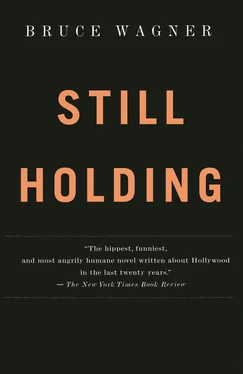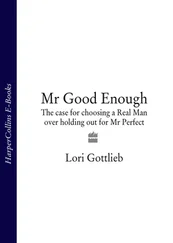It was Sharon’s turn to be puzzled. A light went on: “Oh! That director did! He did go with someone else. I’m sorry.” She tapped her glass. “Too much wine. Another director saw your tape, and he’s very interested. Spike Jonze.”
She dropped the name with the brio of a homespun pimp.
“Spike Jonze?”
“He really likes you. But now I have to get back to my friends. Call you Monday!”
“Nice running into you!”
As Becca moved through the crowded bar, her skin was flush with the excitement of the encounter. She felt that all was preordained and that she’d just been moved by an invisible hand (in the form of Sharon Belzmerz) upon the great magnetized Ouija board of show business destiny.
For the first time since she came to L.A., she felt like a celebrity.
• • •
THE SUITE WAS HUGE. Grady lit a joint, and Cassandra said, “Hey, didn’t they tell you this was a nonsmoking wing?” Room service brought pizza, caviar, ice cream, and booze, and everyone broke apart, then came back together again, disappearing into the bedroom for lines of coke. When Rusty told her the cognac cost eight hundred dollars, Becca said, “Sorry, but I cannot compute.” Cassandra said she was drinking only tequila now. She said it was the purest and actually benefited the baby homeopathically.
At one in the morning, she began to cry over her drowned daughter. “I’m sorry, sweetheart!” she shouted, through pugnacious tears. Whenever Grady went to her side, she shoved him away like a diva. “Baby-girl Questra, I am so sorry I didn’t protect you! Forgive me! Forgive your mama!”
Repelled at the sight of the stoned, egregiously mawkish woman, Becca became sickened by her own response — who was she to judge? She, who didn’t know the first thing about the blood, sweat, and tears of birthing a child, the agony and the ecstasy, the responsibility, and maybe never would…. What gave her the right to sit on high? How could she dare resent someone who’d been through what Cassandra had? Becca shuddered with the realization: It was their money she resented them for. Disgusting! As if they didn’t deserve every dollar! The police had cold-bloodedly shot Grady down, then planted the dope — and if that wasn’t enough, they’d watched their little baby girl die through the negligence of a city maintenance crew. Becca Mondrain, you ought to be ashamed.
Rusty took her to the bedroom. They did more coke, and he kissed her on the bed awhile. When he got overly sexual she became uncomfortable (he hadn’t shut the door), but he kept on. She could hear Cassandra petitioning her unborn son as she roved the living room like a wounded animal.
“I’ll protect you,” she blubbered. “God help me, I will. I won’t let them take you away from me!”
“Come on, Cassie girl,” said Grady, helpless to assuage. “Ain’t nobody gonna take our baby away.”
“They will, they will, they will!”
“Why’d they want to do that, Cass?” His gently logical tone was that of a hostage negotiator.
“The motherfuckers—”
“Why’d they wanna try and take our baby away? Huh, Cass? Why—”
“And if they do,” she said, inconsolably, “someone’s going to righteously pay, understand me, Grady? Someone’s going to fucking pay! Because no one takes my babies! No one takes Cassandra Dunsmore’s babies, I showed ‘em that already. I made them pay. ” Chin lowered, she addressed the womb. “And they’re not going to touch you, OK? Mama Bear ain’t going to let them fucking touch you!”
Becca was dizzy and drunk. Rusty was eating her out when the couple came in, Grady holding his wife’s hand like she was a child just retrieved from Lost and Found. Becca tried to get up, but Rusty was too heavy on her. Grady went to the bed while the half-dressed Cassandra wailed through her soliloquy, incognizant of anything but faceless oppression and grief. Her gut protruded like a cruddy seedpod. Grady stripped off his clothes. He showed Becca his cock — HARD TIMES was inked on it — then let it dangle down. He fastened his mouth to Becca’s freckled tit.
“They killed you!” shouted Cassandra. “But you’re not dead, Questra — you’re not dead! I know you’re not dead. You’re right here with me. Such an old, beautiful soul… how could you be dead? You can’t. You’re not. And we’re rich now and so are you. And when your little bro’s born? We’re gonna go to Disney World and Hawaii and Ground fucking Zero —we’re gonna do all the things families do, OK? Together. And if something happens to little bro at Disney World, if he gets fucked up on Space Mountain, we are gonna take care of business! We gon’ take on Eisner, the King Jew! Better believe it. Cause the jury is our friend, Questra Girl, the jury know how to take care of the Dunsmores. Oh, my baby! My precious baby, baby, baby! You’re gon’ have everything your mama never did, that’s right. That’s right! Cause your mama loves you so much. OK? Loves you so much. Loves you so much. Loves you so much. Loves you so much. Loves you…”
Storming the Temple
KIT MET DARREN Aronofsky in the courtyard of the Chateau. They talked around the project awhile. Matthew McConaughey came through with his dog and said hello.
The director said he wrote Special Needs in just two weeks’ time. His friend Paul Schrader (who loved the script) thought that was a good omen — Paul said the screenplays that exploded out of you always proved to be the most enduring. The germ of the idea had occurred to him while he was watching an old Cliff Robertson movie called Charly; as it turned out, Special Needs was Charly in reverse. What would happen, he wondered, if a famous actor set out to do a film — say, a character study of a retarded man — and before shooting began, sustained injuries in an auto accident that left him “neurologically impaired”? As the story wrote itself out, Darren said that his conceit, which seemed at first a kind of knee-jerk satirical response to a genre that had become a perennial audience pleaser and vainglorious actors’ showcase staple, revealed itself to be more layered and poignant than he could have imagined.
Whatever its origins, Kit thought the script was incredibly complex and controversial. The role would allow him to walk several high wires at once. It was risky (there was always the danger of falling; he recalled his conversation with “Mr. Tourette’s”), but he knew he had no choice. He would face his shame and his fear. Each morning when he awoke, Kit felt like a dud, a popinjay, a cosmic fraud — the biggest travesty of all being that he dared call himself a Buddhist. He was diseased, and further from the Essential Truths than ever. Now, in desperation, he at least owned that terrible, shiny thing his teacher had warned him of:
Hope.
He knew the battle was not in Bodh Gaya — it was in Hollywood, the place where he practiced his craft, the place he had seduced and been seduced by, that had brought him godhood then brought him to his knees. This was his crucible. He remembered Gil Weiskopf Roshi telling him of an enlightened master who refused to allow soldiers into his temple. With joyful indifference, the monk set the room ablaze. “To meditate, seek not the mountain stream — to a still mind, fire itself is cool and refreshing.” The conflagration would be here, not there. And it had already come.
Читать дальше












